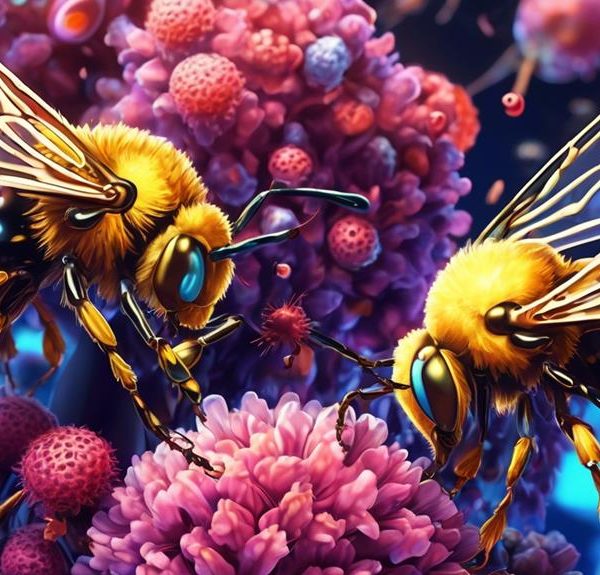Bees, wasps, and peppermint: an intriguing exploration into the complex relationships between these buzzing creatures and this aromatic plant.
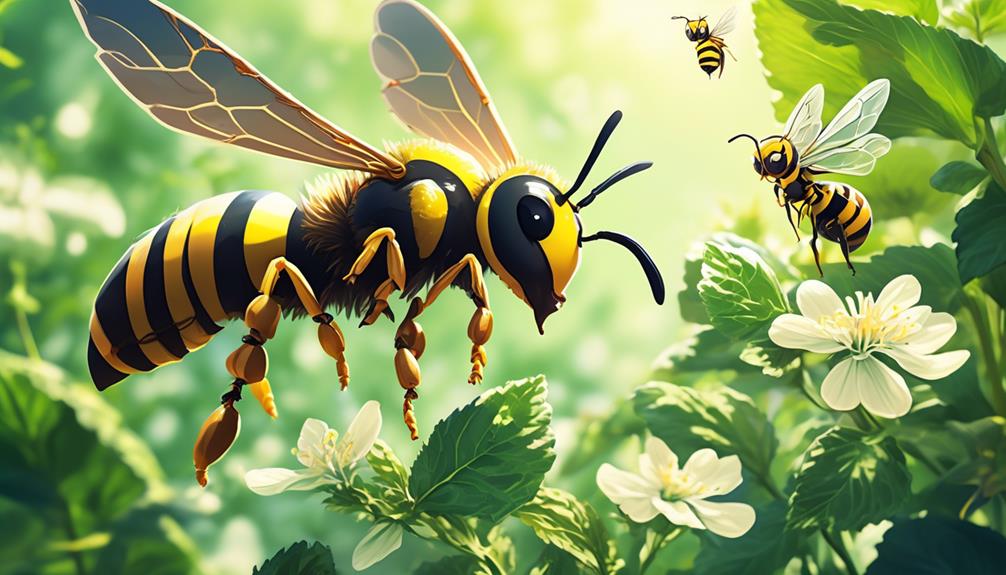
Do Bees and Wasps Like Peppermint?
Did you know that there are over 20,000 different species of bees and 30,000 species of wasps worldwide?
Each of these species varies in their preferences for food and habitat, but one question that intrigues many is whether these buzzing creatures are attracted to, or perhaps repelled by, peppermint.
You might've heard or read something about this topic, but there's a lot more beneath the surface.
So, let's probe into the science behind this intriguing phenomenon, shall we?
Key Takeaways
- Bees and wasps have a complex hierarchical structure and play important roles in the environment.
- Both bees and wasps are attracted to sweet, fruity, and floral scents.
- Peppermint acts as a powerful deterrent for bees and wasps.
- Peppermint oil can be used as a natural repellent for bees and wasps.
Understanding Bees and Wasps
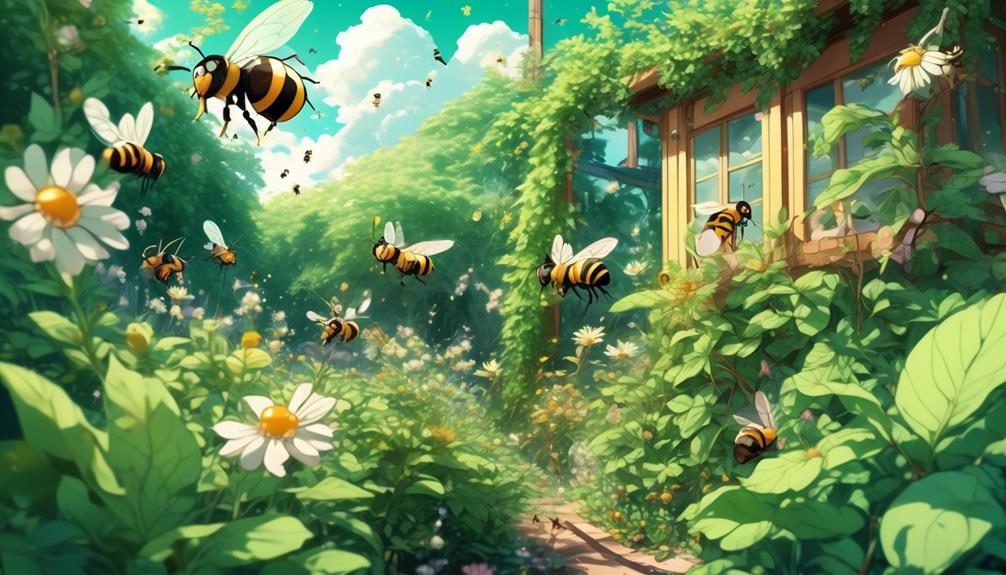
To truly understand bees and wasps, you'll need to delve into their distinct characteristics, behaviors, and the pivotal roles they play in our ecosystem.
Firstly, let's differentiate. Bees are generally less aggressive, furry, and more rounded than wasps. They're extraordinary pollinators, vital to our food chain. In contrast, wasps, with their slim, smooth bodies, are predators that control pest populations, benefiting our gardens and crops.
Now, onto their behaviors. Bees are social creatures, living in large colonies with a complex hierarchical structure. Their life revolves around collecting nectar and pollen to feed their brood. They'll only sting when they feel threatened, as doing so results in their death.
Wasps, however, can be either solitary or social, and they're known for their painful, repetitive stings. They hunt other insects to feed their young and favor sugary foods.
Lastly, let's consider their environmental importance. Bees' pollination is crucial for the reproduction of plants, including those we rely on for food. Wasps, though feared for their sting, are necessary for controlling insect populations that could otherwise become pests.
The Attraction to Scents
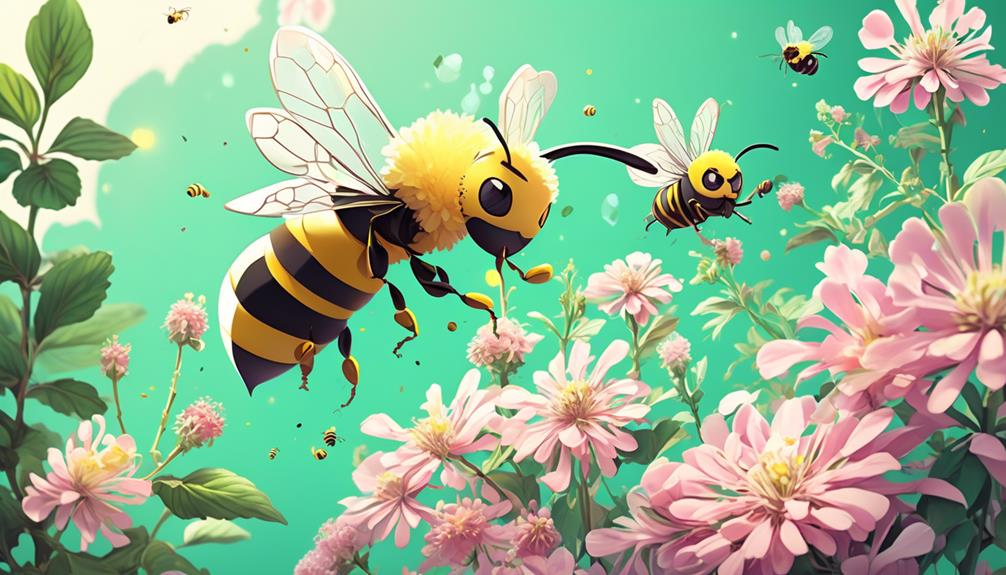
Ever wondered why certain scents seem to attract bees and wasps more than others? The answer lies in the intricate science of their olfactory systems. You see, these creatures have a keen sense of smell, honed by evolution to detect specific floral scents signaling nectar-rich flowers.
Bees and wasps, like many insects, are equipped with olfactory receptors on their antennae. These receptors bind to specific scent molecules, triggering a cascade of signals to the insect's brain. This is how they 'smell' and interpret their surroundings. It's an efficient and accurate system that guides them toward their food sources.
Interestingly, not all scents are created equal in the eyes – or rather, noses – of bees and wasps. They're particularly drawn to sweet, fruity, and floral scents, which typically indicate a good source of nectar. On the flip side, they tend to avoid strong, pungent smells such as peppermint. It's believed that these strong scents overwhelm their olfactory receptors, essentially 'blinding' them and making navigation difficult.
Peppermint's Impact on Insects
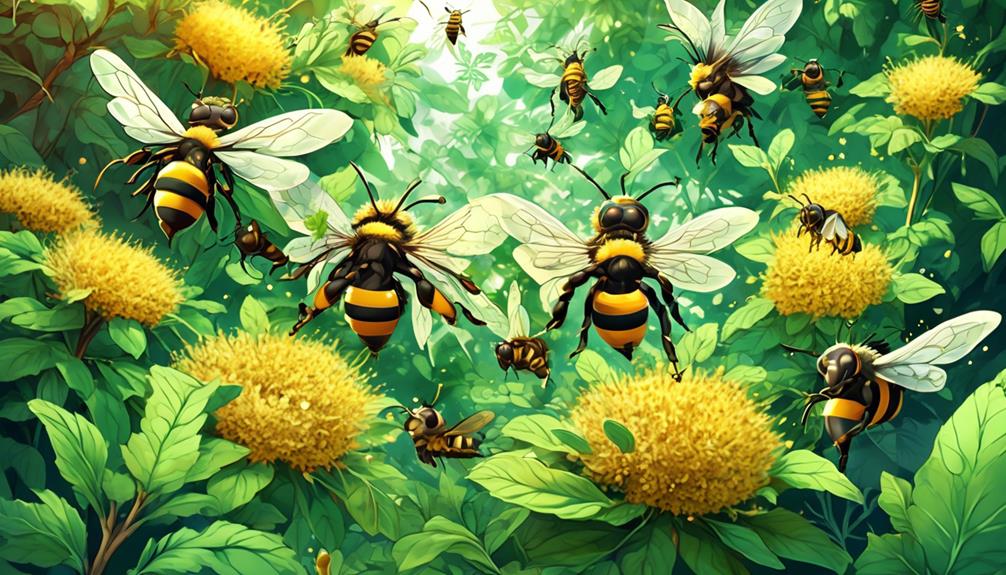
While you might enjoy the refreshing scent of peppermint, for bees and wasps, this potent aroma acts as a powerful deterrent, affecting their behavior and navigation. The strong smell of peppermint confuses these insects' olfactory systems, disrupting their ability to detect food sources. Consequently, they'll avoid areas where this scent is prevalent.
Let's delve a little deeper into the science behind this. Insects perceive smells differently than humans. They use their antennae to detect chemical signals in the environment. Peppermint's strong scent is thought to overwhelm these signals, causing a kind of sensory overload that's unpleasant for the insects.
Here's a simple table detailing the effects of peppermint on some common insects:
Insect | Reaction to Peppermint | Reason |
|---|---|---|
Bees | Avoidance | Overwhelms olfactory sensors |
Wasps | Avoidance | Overwhelms olfactory sensors |
Ants | Avoidance | Disrupts pheromone trails |
Mosquitoes | Avoidance | Interferes with CO2 detection |
Practical Uses of Peppermint
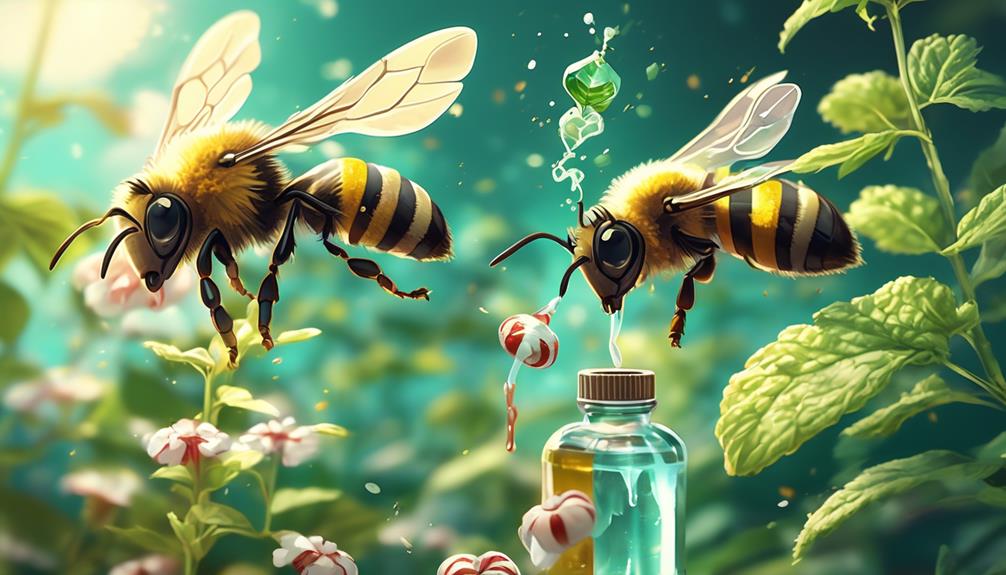
You can leverage the potent scent of peppermint in numerous practical ways, particularly for natural pest control. By using peppermint oil, you can create a simple, homemade repellent for bees and wasps. Compared to commercial pesticides, this all-natural solution isn't only cost-effective, but also environmentally friendly.
The process is straightforward: mix about 10-15 drops of peppermint oil with water in a spray bottle. Shake it well to ensure proper diffusion. Then, spray it around your home, especially in places where you've spotted these insects. The strong scent of peppermint works as an efficient deterrent, warding off bees and wasps due to their innate aversion to this aroma.
However, it's not an instant solution. You'll need to reapply the mixture regularly, particularly after rain or when the scent weakens. Remember, these insects aren't just repelled by the smell; peppermint oil can also disrupt their pheromone trails, making it difficult for them to find their way back to their nests.
Scientific Research Findings
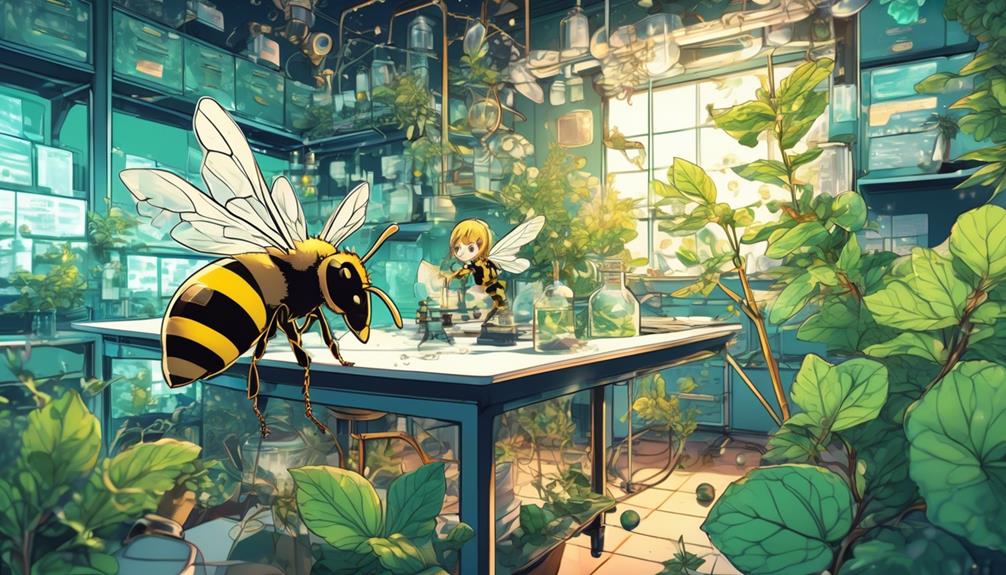
Building on the practical uses of peppermint oil as a deterrent for bees and wasps, let's now examine the underlying scientific research that validates this natural pest control method.
Studies have shown that the strong aroma of peppermint oil interferes with bees' and wasps' sense of smell, which is vital for them to locate food and navigate.
One study published in the 'Journal of Pest Management Science' revealed that peppermint oil successfully repelled yellow jackets and paper wasps. It concluded that the oil disrupts their pheromone trails, leading to disorientation.
A separate study in the 'Journal of Insect Science' found that peppermint oil, when used in combination with other essential oils, was effective in repelling honey bees. The researchers suggested that the potent smell of the oil overpowered the bees' olfactory system, making it harder for them to detect food sources.
These findings highlight the potency of peppermint oil as a natural, non-toxic deterrent for bees and wasps.
However, it's important to note that more research is needed to fully understand the long-term effects of this oil on these insects and their ecosystems. Until then, peppermint oil remains a promising, eco-friendly pest control solution.
Frequently Asked Questions
What Other Smells Do Bees and Wasps Dislike Apart From Peppermint?
Apart from peppermint, you'll find that bees and wasps also dislike the smells of citrus, eucalyptus, and lemongrass. They're turned off by strong, potent scents, including tea tree, spearmint, and thyme. Citronella's another one they don't favor.
Essential oils derived from these plants can effectively deter these insects. However, ensure you're not harming beneficial bees when using these deterrents.
How Can I Safely Use Peppermint to Deter Bees and Wasps Without Harming Them?
You can safely deter bees and wasps using peppermint without causing them harm. Simply mix a few drops of peppermint oil with water in a spray bottle.
Spray this mixture around your outdoor spaces, especially areas where you've noticed bees or wasps. Remember, it's important not to spray directly on them as this could be harmful.
Keep refreshing the scent regularly, as it'll naturally dissipate over time.
Can a Peppermint Allergy Affect a Person's Ability to Use It as a Repellent for Bees and Wasps?
Yes, if you have a peppermint allergy, it can affect your ability to use it as a repellent. You would likely experience allergic reactions such as skin irritation, sneezing, or more severe symptoms. It's crucial to consider your health first.
If you are allergic to peppermint, you should seek alternatives like lemongrass or citronella. Always test on a small area first to ensure you won't have an allergic reaction.
Do Other Insects Also Have Reactions to Peppermint, or Is It Specific to Bees and Wasps?
You're right to wonder if other insects react to peppermint. It's not just bees and wasps. Many insects, including mosquitoes and ants, show averse reactions to peppermint. The strong aroma disrupts their sense of smell, making it harder for them to locate food and mates.
However, not all insects respond the same way, and some mightn't be affected at all. It's a fascinating area of study, isn't it?
Are There Any Potential Negative Impacts on the Environment From Using Peppermint as a Deterrent for Bees and Wasps?
You're curious about potential environmental impacts of using peppermint as a deterrent for bees and wasps. Well, it's not likely to harm your local ecosystem. It's a natural substance and won't pollute the environment like synthetic pesticides might.
However, if you're using it excessively, it could potentially disrupt the natural behavior of these insects and other pollinators, which could have a ripple effect on plants that depend on them for pollination. So, it's best to use it sparingly.
Conclusion
In conclusion, you've learned that bees and wasps aren't fans of peppermint. Its strong scent disrupts their communication and navigation abilities, making it an effective deterrent.
Practical uses of peppermint, like homemade sprays, can be helpful in your bee and wasp management.
However, more scientific research is needed to fully understand the potential impacts and efficacy of peppermint as a natural insect repellent.


